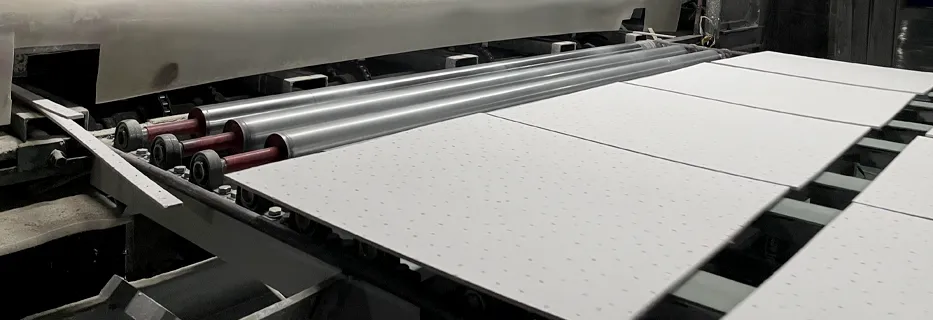- Afrikaans
- Albanian
- Amharic
- Arabic
- Armenian
- Azerbaijani
- Basque
- Belarusian
- Bengali
- Bosnian
- Bulgarian
- Catalan
- Cebuano
- Corsican
- Croatian
- Czech
- Danish
- Dutch
- English
- Esperanto
- Estonian
- French
- German
- Greek
- Hindi
- Indonesian
- irish
- Italian
- Japanese
- Korean
- Lao
- Malay
- Myanmar
- Norwegian
- Norwegian
- Polish
- Portuguese
- Romanian
- Russian
- Serbian
- Spanish
- Swedish
- Thai
- Turkish
- Ukrainian
- Uzbek
- Vietnamese
nov . 11, 2024 07:04 Back to list
mineral fibre suspended ceiling tiles
The Rise of Mineral Fibre Suspended Ceiling Tiles A Comprehensive Overview
In the world of commercial and residential construction, the choice of materials plays a crucial role in determining the functionality, aesthetics, and acoustics of interior spaces. Among the various options available, mineral fibre suspended ceiling tiles have emerged as a popular choice for builders, architects, and property developers alike. This article delves into the characteristics, benefits, and considerations related to mineral fibre suspended ceiling tiles.
What are Mineral Fibre Suspended Ceiling Tiles?
Mineral fibre ceiling tiles are made from a blend of natural and synthetic materials, primarily including mineral wool, which is derived from rock or slag. This type of tile is designed to be suspended from a grid system, allowing for easy installation and access to the ceiling cavity above. The tiles can come in various textures, colors, and sizes, making them versatile for different interior designs.
Key Advantages of Mineral Fibre Ceiling Tiles
1. Acoustic Performance One of the most significant advantages of mineral fibre suspended ceiling tiles is their acoustic properties. The porous nature of mineral wool allows these tiles to absorb sound effectively, reducing noise levels within a space. This is particularly beneficial in environments such as offices, schools, and hospitals, where noise control is essential for productivity and comfort.
2. Thermal Insulation Beyond sound absorption, mineral fibre tiles also provide excellent thermal insulation. They help maintain consistent indoor temperatures by resisting heat transfer, which can lead to energy savings in climate-controlled environments. This insulation quality contributes to the overall energy efficiency of buildings.
3. Fire Resistance Safety is a top priority in construction, and mineral fibre tiles are known for their fire-resistant properties. Made from non-combustible materials, they can help slow the spread of fire, giving occupants more time to evacuate and potentially preventing severe damage to the building. Many of these tiles meet stringent fire safety standards, making them a reliable option for commercial spaces.
4. Moisture Resistance In areas prone to humidity, such as bathrooms and kitchens, moisture resistance is vital. Many mineral fibre ceiling tiles are treated to resist moisture, preventing sagging, warping, or mold growth. This ensures longevity and maintainability, even in challenging environments.
mineral fibre suspended ceiling tiles

5. Easy Installation and Maintenance The modular nature of suspended ceiling systems allows for quick installation. Mineral fibre tiles can be easily replaced or removed for access to hidden utilities, making maintenance straightforward. Additionally, most tiles can be cleaned with a damp cloth or vacuumed, maintaining their appearance without significant effort.
Considerations When Choosing Mineral Fibre Ceiling Tiles
While there are numerous advantages to using mineral fibre suspended ceiling tiles, it is essential to consider some factors before making a decision
1. Weight Despite their durability, mineral fibre tiles can be heavy. This necessitates careful consideration of the supporting grid and mounting systems to ensure they can safely bear the weight.
2. Aesthetics and Finishes While mineral fibre tiles come in different styles and finishes, they may not always meet the aesthetic preferences of some designers. It’s crucial to select tiles that complement the overall design theme of the space.
3. Environmental Impact As sustainability becomes a priority in construction, the eco-friendliness of materials used in ceilings is gaining attention. Many manufacturers now produce mineral fibre tiles with recycled content or low VOC (volatile organic compound) emissions. It’s essential to research options that align with sustainable building practices.
Conclusion
Mineral fibre suspended ceiling tiles offer a combination of acoustic, thermal, and fire-resistant properties that make them an attractive choice for a wide range of applications. Their ease of installation and maintenance further enhance their appeal in various projects, from commercial offices to educational institutions. By carefully considering the aesthetics and environmental impact of these tiles, builders can select the best options to create functional, safe, and visually appealing spaces. As the demand for innovative building materials continues to grow, mineral fibre ceiling tiles are likely to remain a staple choice in the construction industry for years to come.
-
Transform Interiors with PVC Gypsum Ceiling: A Stylish, Durable, and Moisture-Resistant SolutionNewsMay.19,2025
-
The Smart Interior Upgrade: Discover the Durability and Versatility of Gypsum Ceiling Access Panel SolutionsNewsMay.19,2025
-
The Smart Choice for Interior Design: Discover the Value of PVC Gypsum Ceiling SolutionsNewsMay.19,2025
-
Mineral Fiber Ceiling Tiles: The Smart Blend of Performance and AestheticsNewsMay.19,2025
-
Mineral Fiber Ceiling Tiles: The Superior Choice Over Gypsum for Sound and Fire SafetyNewsMay.19,2025
-
Mineral Fiber Ceiling Tiles: Eco-Friendly Strength and Style for Every CeilingNewsMay.19,2025







